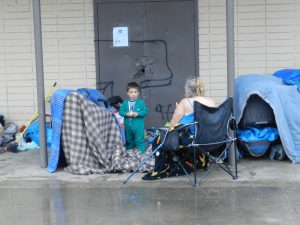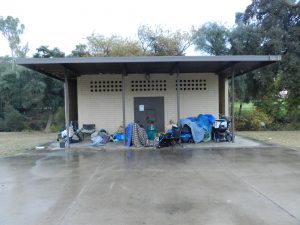
Call him Martin. He’s a homeless man and meth user. In the last year, he’s been in jail four times and in the hospital twice. His jail time has ranged from a few days to several weeks. His last hospital stay was almost six weeks.
Then there’s the Oakdale man who’s periodically arrested for misdemeanors related to homelessness. He’s often driven to the county jail in Modesto, held a few days or hours, then released, usually around 5:30am. He’s a good walker and can be back in Oakdale by mid-afternoon, when he buys a forty-ounce beer, wraps it in a brown paper sack, and starts the cycle over again.
Chronically homeless people often have long arrest records. It’s easy to assume the arrests always involve drugs, but sometimes arrests and citations are for “crimes” like camping in a city park.
Police officers say, “We know we can’t arrest our way out of this situation,” but continue to arrest homeless people, mostly because of citizen complaints. Apparently, most citizens haven’t yet realized the futility of arresting people who are soon released and right back where they started from.
But futility isn’t the only problem with arresting homeless people. Another problem is the cost, not just in dollars but in distraction of law enforcement from attention to serious crime.
The cost of incarceration of one prisoner at the county level is generally estimated to be well over $40,000 a year. That doesn’t include lost hours busting, citing, transporting, and booking homeless people guilty of victimless crimes.
In one of the leading cities for auto theft nationwide, Modesto residents have learned that police response can be a hit-and-miss proposition—mostly miss. They’re told it’s because officers are too busy with “serious crime.”

Serious crime notwithstanding, citizen outrage at the presence of homeless people in our parks and on our streets keeps cops occupied with what are usually minor infractions. The really curious thing is the refusal of most everyone to consider allowing homeless people to stay in sanctioned locations, including parks, empty lots, and vacant buildings.
Instead, despite abundant evidence to the contrary, there is a widespread belief that if we keep punishing homeless people, they will go away. The fact that they have nowhere to go simply doesn’t register.
A few local leaders have suggested it might be less costly to suspend Modesto’s anti-camping ordinance in a few places and then try to direct people experiencing homelessness toward those locations. Generally, officials react with horror and claim such a policy would only make things worse.
Meanwhile, the city and county will spend several hundred-thousand dollars to set up twenty garden sheds in a lot near the Salvation Army Shelter on Modesto’s Ninth Street, knowing full well there are at least a thousand homeless people in Modesto alone, including destitute women and children and the mentally ill. The sheds are designed to house forty people.*
It seems we’d rather keep using our jails and police officers as the primary forces against homelessness, despite the costs, futility, and cruelty. Though authorities say homelessness isn’t a crime, we seem to be doing our very best to make it one.
* Another two-hundred thirty-five total beds are available at the Modesto Gospel Mission and Salvation Army shelter.
